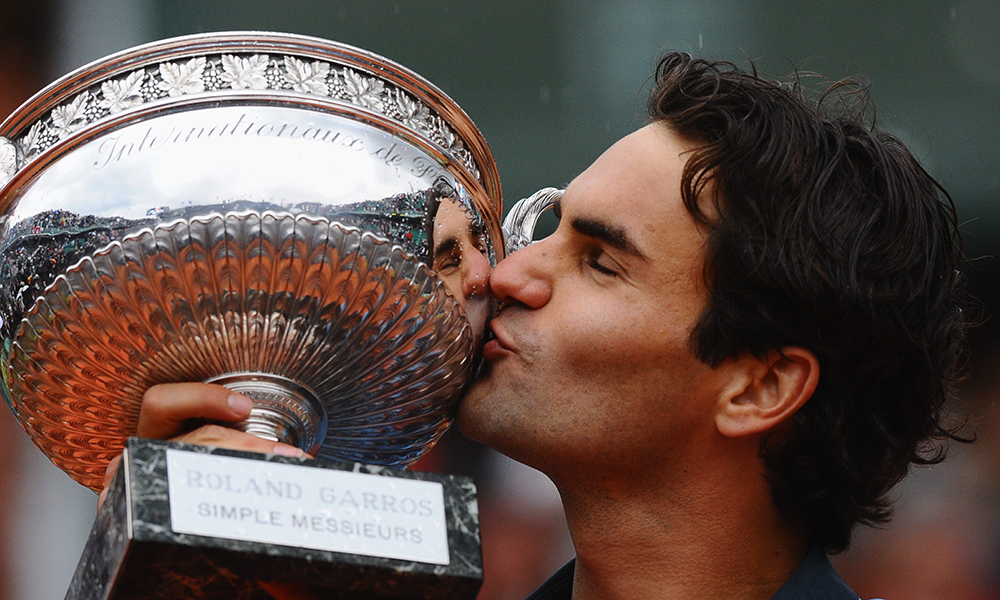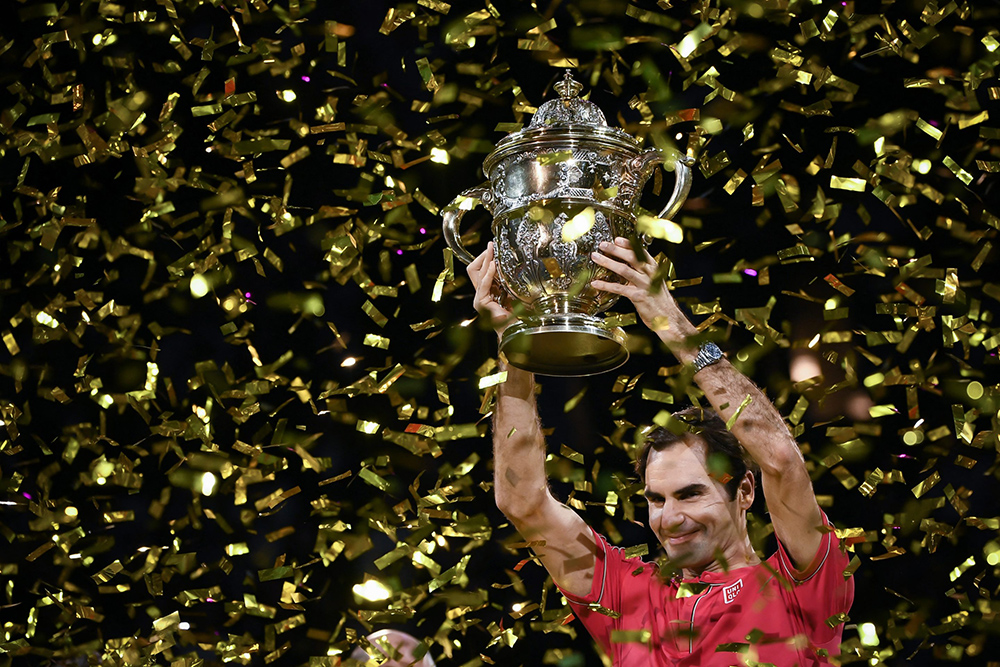
早在《挑战者》(Challengers)将网球变成隐喻之前,罗杰·费德勒就从这项运动中学习人生经验。他在达特茅斯学院(Dartmouth College)最新一届毕业生的毕业演讲中传授了许多人生经验。该演讲如今在网上走红。
他开玩笑说:“毕业生们,我对你们的痛苦感同身受。我知道当人们不断问你下半辈子有什么打算时是什么感觉。”尽管离开了职业球场,费德勒仍在分享他在球场上学到的智慧。
这位刚刚退役的明星运动员在2000年代成为家喻户晓的人物,连续237周蝉联ATP单打冠军(后被打破)。他不仅从胜利中收获了很多经验,也从失败中吸取了很多教训,他将自己长达数十年的职业生涯归纳为三条主要经验,供2024届毕业生参考。
不费吹灰之力是个神话
费德勒说冷静是一种习得的技能,就像朱莉娅·罗伯茨(Julia Roberts)说每位红发人士都是通过使用盒装染料染发才能获得一头红发一样。尽管名声在外,但费德勒在青少年时期也是个急性子,他描述了自己如何努力控制脾气,从而看起来不那么烦躁。
很多人说他打球毫不费力,这让他很生气。他坚持认为,不努力就不会取得成功。
他说:“事实上,竭尽全力才能看起来毫不费力。在我学会保持冷静之前,我花了好几年的时间抱怨、咒骂......扔球拍。”
费德勒指出,即使他的父母和教练指责他,他的态度也只是在对手公开承认他的行为后才有所改变。
他的对手说:“罗杰在前两个小时是最受欢迎的,之后我就是最受欢迎的了。”在职业生涯早期,费德勒感到很困惑。但他说自己逐渐明白了其中的含义。当你感到精神焕发的时候,打出好成绩既简单又容易;后来,当你的意志消退、身体疲惫的时候,那时的表现才真正重要。
“这让我明白,我还有很多工作要做。”他表示,并解释说,他训练的目的就是为了获得这样的声誉,因为他意识到“不费吹灰之力取胜才是最终成就”。
将这一点与毕业班联系起来,费德勒问他们有多少次看到同龄人不费吹灰之力就取得好成绩。“希望你们能像我一样,明白不费吹灰之力只是一个神话。我取得今天的成就,并非仅凭天赋,而是通过努力超越对手才实现的。”
费德勒承认“天赋很重要”,但他说这不是与生俱来的。在生活和网球运动中,“天赋并不重要,重要的是勇气”。
只是一分而已
费德勒承认,无论你在比赛中付出多少汗水和泪水,都有可能无缘奖杯。
他最大的失利是2008年的温布尔登网球锦标赛,当时他正为实现历史性的成就而战:六连冠。费德勒记得,他一度认为自己的对手拉菲尔·纳达尔(Rafael Nadal,赢得22个大满贯男子单打冠军)比他更渴望夺冠。就在那时,比赛结束了。尽管他在最后一刻增强了信心,但这“来得太晚了”,他还是输了。费德勒还记得有人说这是他职业生涯的终点。

即使这是一场不朽的比赛,但也只是他职业生涯中的一个小插曲。费德勒说:“在网球运动中,完美是无法实现的。虽然他在一段时间内都是佼佼者,但还是经常失误。费德勒指出,在1526场单打比赛中,他有80%场获胜,但只拿到总分的54%。
平均而言,错失每一分都会让费德勒“学会不要纠结于每一次击球”,包括他里程碑式的胜利和失败。当然,每一分你都要全力以赴,但一旦完成,再纠结也没有用。他补充说,让过去成为过去,可以让你把一切都投入到每一刻或每一分上。
他说:“事实上,无论你在生活中玩什么游戏,有时你都会输掉一分、一场比赛、一个赛季或丢掉一份工作。开始怀疑自己、自怨自艾再正常不过了。但负能量就是在浪费能量。”
正是在这些艰难时刻,才造就了真正的赢家:“世界上最优秀的人之所以是最优秀的,并不是因为他们赢得了每一分,而是因为他们知道自己会一败再败。”
生活比球场更重要
费德勒解释说,球场毕竟很小,只比宿舍大一点。尽管他在那里建立了自己的生活,但他知道生活中还有比网球世界更重要的东西。
费德勒说他的生活很有意义,“被旅行、文化、友谊,尤其是家庭填满”。在环游世界的同时,他转而投身慈善事业,创建了一个基金会,旨在普及早期儿童教育。
尽管当时他只有22岁,觉得自己可能还太年轻,不应涉足网球以外的领域,但他还是抓住机会,成立了罗杰·费德勒基金会,并发现自己的旅程收获颇丰。费德勒指出,慈善不仅仅是捐钱,还包括奉献思想和时间,他敦促毕业生们跳出舒适区,接受新观念。
他补充说:“你们每个人都有很多东西可以奉献,我希望你们能找到自己独特的方式来改变现状,因为生活的范畴确实要比球场大得多。”(财富中文网)
译者:中慧言-王芳
早在《挑战者》(Challengers)将网球变成隐喻之前,罗杰·费德勒就从这项运动中学习人生经验。他在达特茅斯学院(Dartmouth College)最新一届毕业生的毕业演讲中传授了许多人生经验。该演讲如今在网上走红。
他开玩笑说:“毕业生们,我对你们的痛苦感同身受。我知道当人们不断问你下半辈子有什么打算时是什么感觉。”尽管离开了职业球场,费德勒仍在分享他在球场上学到的智慧。
这位刚刚退役的明星运动员在2000年代成为家喻户晓的人物,连续237周蝉联ATP单打冠军(后被打破)。他不仅从胜利中收获了很多经验,也从失败中吸取了很多教训,他将自己长达数十年的职业生涯归纳为三条主要经验,供2024届毕业生参考。
不费吹灰之力是个神话
费德勒说冷静是一种习得的技能,就像朱莉娅·罗伯茨(Julia Roberts)说每位红发人士都是通过使用盒装染料染发才能获得一头红发一样。尽管名声在外,但费德勒在青少年时期也是个急性子,他描述了自己如何努力控制脾气,从而看起来不那么烦躁。
很多人说他打球毫不费力,这让他很生气。他坚持认为,不努力就不会取得成功。
他说:“事实上,竭尽全力才能看起来毫不费力。在我学会保持冷静之前,我花了好几年的时间抱怨、咒骂......扔球拍。”
费德勒指出,即使他的父母和教练指责他,他的态度也只是在对手公开承认他的行为后才有所改变。
他的对手说:“罗杰在前两个小时是最受欢迎的,之后我就是最受欢迎的了。”在职业生涯早期,费德勒感到很困惑。但他说自己逐渐明白了其中的含义。当你感到精神焕发的时候,打出好成绩既简单又容易;后来,当你的意志消退、身体疲惫的时候,那时的表现才真正重要。
“这让我明白,我还有很多工作要做。”他表示,并解释说,他训练的目的就是为了获得这样的声誉,因为他意识到“不费吹灰之力取胜才是最终成就”。
将这一点与毕业班联系起来,费德勒问他们有多少次看到同龄人不费吹灰之力就取得好成绩。“希望你们能像我一样,明白不费吹灰之力只是一个神话。我取得今天的成就,并非仅凭天赋,而是通过努力超越对手才实现的。”
费德勒承认“天赋很重要”,但他说这不是与生俱来的。在生活和网球运动中,“天赋并不重要,重要的是勇气”。
只是一分而已
费德勒承认,无论你在比赛中付出多少汗水和泪水,都有可能无缘奖杯。
他最大的失利是2008年的温布尔登网球锦标赛,当时他正为实现历史性的成就而战:六连冠。费德勒记得,他一度认为自己的对手拉菲尔·纳达尔(Rafael Nadal,赢得22个大满贯男子单打冠军)比他更渴望夺冠。就在那时,比赛结束了。尽管他在最后一刻增强了信心,但这“来得太晚了”,他还是输了。费德勒还记得有人说这是他职业生涯的终点。
即使这是一场不朽的比赛,但也只是他职业生涯中的一个小插曲。费德勒说:“在网球运动中,完美是无法实现的。虽然他在一段时间内都是佼佼者,但还是经常失误。费德勒指出,在1526场单打比赛中,他有80%场获胜,但只拿到总分的54%。
平均而言,错失每一分都会让费德勒“学会不要纠结于每一次击球”,包括他里程碑式的胜利和失败。当然,每一分你都要全力以赴,但一旦完成,再纠结也没有用。他补充说,让过去成为过去,可以让你把一切都投入到每一刻或每一分上。
他说:“事实上,无论你在生活中玩什么游戏,有时你都会输掉一分、一场比赛、一个赛季或丢掉一份工作。开始怀疑自己、自怨自艾再正常不过了。但负能量就是在浪费能量。”
正是在这些艰难时刻,才造就了真正的赢家:“世界上最优秀的人之所以是最优秀的,并不是因为他们赢得了每一分,而是因为他们知道自己会一败再败。”
生活比球场更重要
费德勒解释说,球场毕竟很小,只比宿舍大一点。尽管他在那里建立了自己的生活,但他知道生活中还有比网球世界更重要的东西。
费德勒说他的生活很有意义,“被旅行、文化、友谊,尤其是家庭填满”。在环游世界的同时,他转而投身慈善事业,创建了一个基金会,旨在普及早期儿童教育。
尽管当时他只有22岁,觉得自己可能还太年轻,不应涉足网球以外的领域,但他还是抓住机会,成立了罗杰·费德勒基金会,并发现自己的旅程收获颇丰。费德勒指出,慈善不仅仅是捐钱,还包括奉献思想和时间,他敦促毕业生们跳出舒适区,接受新观念。
他补充说:“你们每个人都有很多东西可以奉献,我希望你们能找到自己独特的方式来改变现状,因为生活的范畴确实要比球场大得多。”(财富中文网)
译者:中慧言-王芳
Long before Challengers turned tennis into a metaphor, Roger Federer used his sport as a way into learning life’s lessons. He imparted a number of them to Dartmouth College’s latest graduating class in what has now become a viral commencement speech.
“Graduates, I feel your pain. I know what it’s like when people keep asking what your plan is for the rest of your life,” he joked. But even though he’s left the professional courts, Federer is sharing the wisdom he learned from his time on the grass.
The newly retired star athlete became a household name in the 2000s, spending a (since broken) record 237 consecutive weeks as the No. 1 in singles tennis by the ATP. He’s gleaned a lot not just from his wins but also from his defeats, as he breaks down his decades-long career into three main takeaways for the class of 2024.
Effortless is a myth
Federer saying calmness is a learned skill is not unlike Julia Roberts saying every redhead is a box dye. But despite his reputation, Federer was a hothead as a teenager and describes his attempts to rein it in and seem unbothered.
Describing his being bristled by many people saying his playing was effortless, he insists that no success comes without trying.
“The truth is I had to work very hard to make it look easy,” he said. “I spent years whining, swearing … throwing my rackets before I learned to keep my cool.”
Federer noted that even with his parents and coaches calling him out, his attitude only changed when one of his opponents publicly recognized his behavior.
“Roger will be the favorite for the first two hours, then I’ll be the favorite after that,” his opponent said. Still early in his career, Federer was confused. But he describes coming to understand the meaning. Doing well when you’re feeling fresh is simple and easy; it’s later on when your resolve fades and your body gets tired that the performance really matters.
“It made me understand I have so much work ahead of me,” he said, explaining that he trained to get that collected reputation as he realized “winning effortlessly is the ultimate achievement.”
Relating it back to the graduating class, Federer asks how often they saw their peers get good grades without putting much of a sweat in. “Hopefully like me, you learn that effortless is a myth. I didn’t get where I got [by] pure talent alone. I got there by trying to outwork my opponents,” he continued.
Federer recognized “talent matters,” but said it’s not an innate thing. In life and in tennis, “not about having a gift, it’s about having grit.”
It’s only a point
No matter how much sweat and tears you put into a game, you can still walk away sans trophy, Federer acknowledges.
His biggest loss was the 2008 Wimbledon tournament, where he was playing to reach a historical achievement: six consecutive titles. At one point, Federer remembers thinking his opponent—Rafael Nadal, who’s won 22 Grand Slam men’s singles titles—was hungrier than he was. That’s when the game was over. Even though he had a last-minute boost of confidence, it “came too late,” and he lost. Federer remembers how some people suggested that it was the end of his career.
But even though it was a monumental game, it really was only a blip in his career. “In tennis, perfection is impossible,” Federer said. While he was top dog for a stretch of time, he still whiffed a lot. Federer noted he won 80% of his 1,526 singles matches, but only 54% of all points.
On average, missing every second point made Federer “learn not to dwell on every shot,” including his milestone wins and losses. Of course, you bring everything you have into each point, but once it’s done then it’s no use lingering. And letting the past stay in the past allows you to put everything into each moment or point, he added.
“The truth is, whatever game you play in life, sometimes, you’re going to lose a point, a match, a season, a job,” he said. “It’s natural when you’re down to doubt yourself, and to feel sorry for yourself. But negative energy is wasted energy.”
It’s in those hard times that a real winner is made: “The best in the world are not the best because they win every point. It’s because they know they’ll lose again and again.”
Life is bigger than the court
A court is small after all, only a bit bigger than a dorm room, Federer explained. Even though that’s where he built his life, he knew there was more to life than the world of tennis.
Federer said he’s had “a rewarding life full of travel, culture, friendships, and especially family.” While traveling the world, he turned to philanthropy and created a foundation toward making early-childhood education more accessible.
Though he was just 22 years old at the time, feeling perhaps he was too young to dive into anything beyond tennis, he took a chance, launched the Roger Federer Foundation, and found his journeys immensely rewarding. Noting that philanthropy is not just about donating money, but also ideas and time, Federer urged graduates to look outside their own bubbles they’ve built as well.
“All of you have so much to give, and I hope you will find your own unique ways to make a difference, because life really is much bigger than the cort,” he added.






